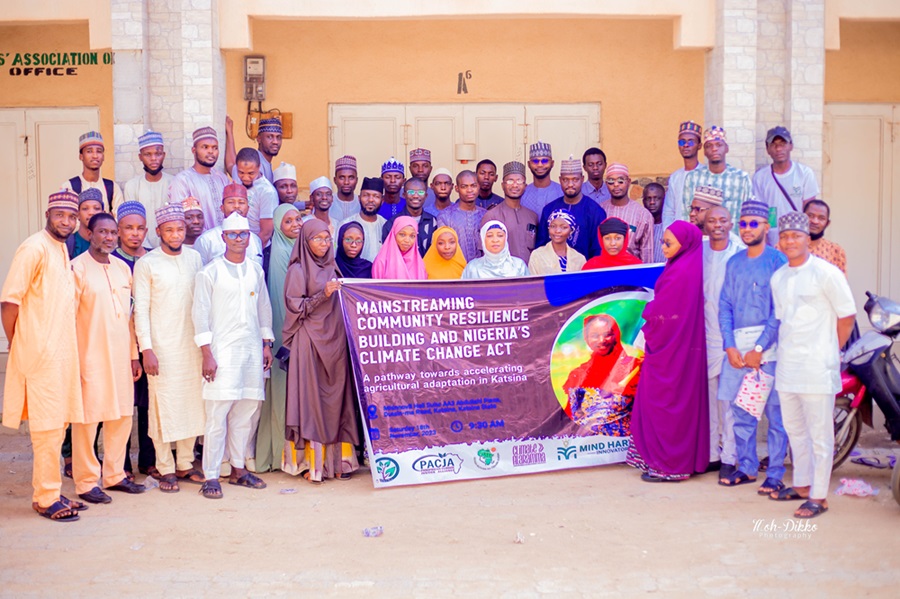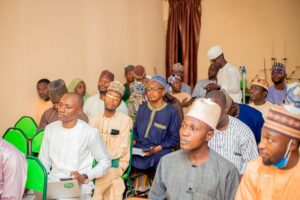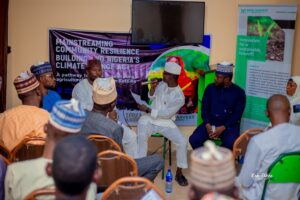
Reported by Paul Gwumapan Joseph
Climate and Sustainable Development Network (CSDevNet), in collaboration with Climate Alaramma Sustainable Development Initiative (CASDI) and Mind Harvest Innovators, held a one-day workshop that brought together over 40 individuals, spanning NGO representatives, activists, government officials, public servants, local farmers, academia, and students in Katsina on 18th November 2023.
The goal was to empower local communities to comprehend and adapt to climate change through community engagement, early warning systems, adaptive management, and the creation of community-specific action plans.
To begin, Paul Joseph Gwumapan, the representative of CSDevNet National Network Coordinator, set the stage with insightful opening remarks, acknowledging the crucial role of the event in enhancing capacity resilience for accelerated agricultural adaptation in Katsina.
He lauded the organizers and participants for their commitment and urged open dialogue and knowledge sharing to propel community resilience into the forefront of climate justice and advocacy.

Similarly, Ibrahim S. Mohammed, Co-founder CASDI, in his opening remarks, welcomed participants and expressed gratitude to CSDevNet partners for their invaluable support.
The workshop featured dynamic presentations, each contributing a unique perspective to the overarching theme.
Furthermore, Yazid Salahudeen Mikail, Co-Founder of CASDI, delivered a presentation on “Community Engagement for Climate Action.”
Yazid spoke passionately about the importance of community engagement in combating climate change and its impact on local communities. He underlined the importance of communities taking ownership and action for a sustainable future, emphasizing the transition to environmentally friendly energy alternatives.
Additionally, Dr. Sulaiman Bello, a lecturer at Katsina State University, presented on “Climate Change Adaptation and Resilience” in a second session.
Dr. Bello discussed Katsina’s climatic challenges in detail, highlighting temperature increases, irregular rainfall, plant depletion, soil degradation, and desert encroachment.
He advocated for a shift away from traditional farming techniques, promoting the use of technology and new approaches while raising awareness about the economic benefits of environmentally friendly energy sources.
Ibrahim S. Mohammed led a diverse panel comprising experts in food technology, environmental law, ICT, agropreneurship, and climate activism. The panel delved into topics such as grassroots awareness, inclusion, agricultural adaptation practices, and the crucial role of women in agriculture. Lack of awareness emerged as a significant barrier to progress in climate action within local communities.
Participants passionately expressed their concerns, highlighting cigarettes and nylon bags as contributors to climate change.

Calls for policy changes were made, advocating for the ban of these harmful elements. The burning of tires, especially in healthcare centers, was identified as a pressing issue, reflecting negligence in climate action.
Additionally, the security challenges in the state leading to high migration from rural areas were acknowledged as obstacles to effective climate action.
The workshop culminated in a list of actionable recommendations:
- Improve access to climate information at the grassroots.
- Adopt new energy sources.
- Disseminate climate change information through local radio broadcasts.
- Increase membership in formal and informal groups.
- Promote water harvesting.
- Mainstream gender inclusion in climate change initiatives.
- Utilize social media and digital platforms for climate change awareness.
The Katsina Community Resilience Building Workshop provided a pivotal platform for learning, dialogue, and capacity building. It marked a significant step towards empowering Katsina communities to not only understand but adapt and thrive in the face of climate change.
As the lessons resonate and recommendations become actions, the journey towards a resilient and sustainable future in Katsina gains momentum, promising a community ready to face the challenges of tomorrow.
